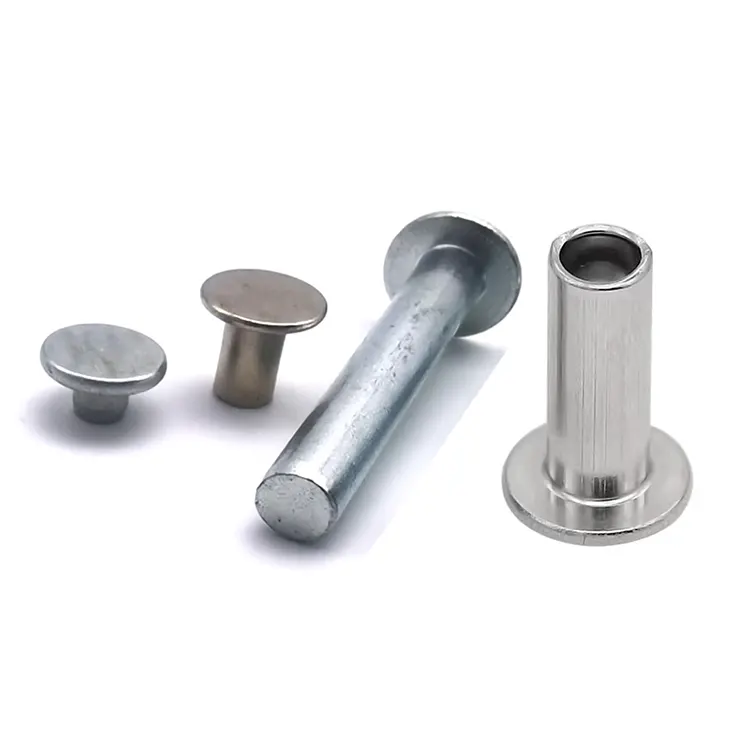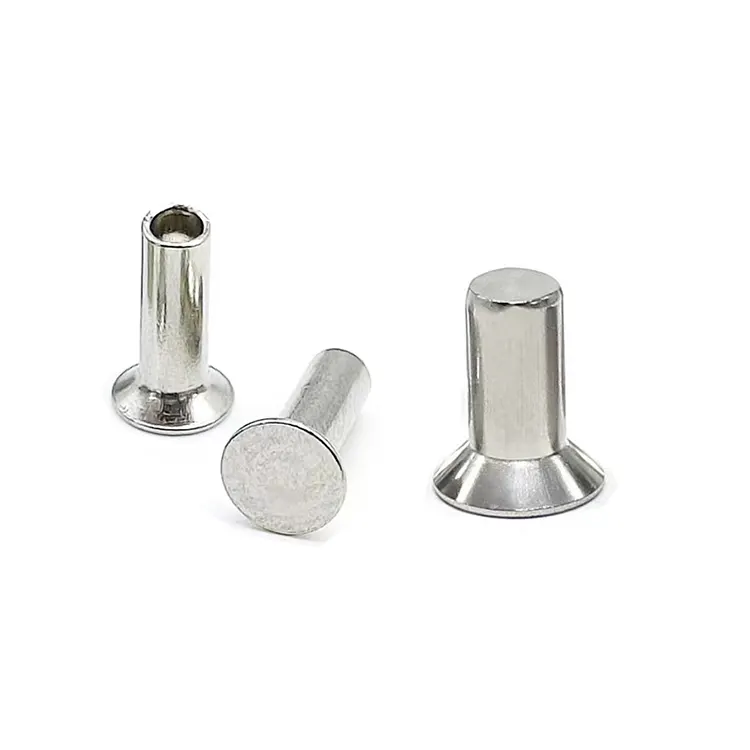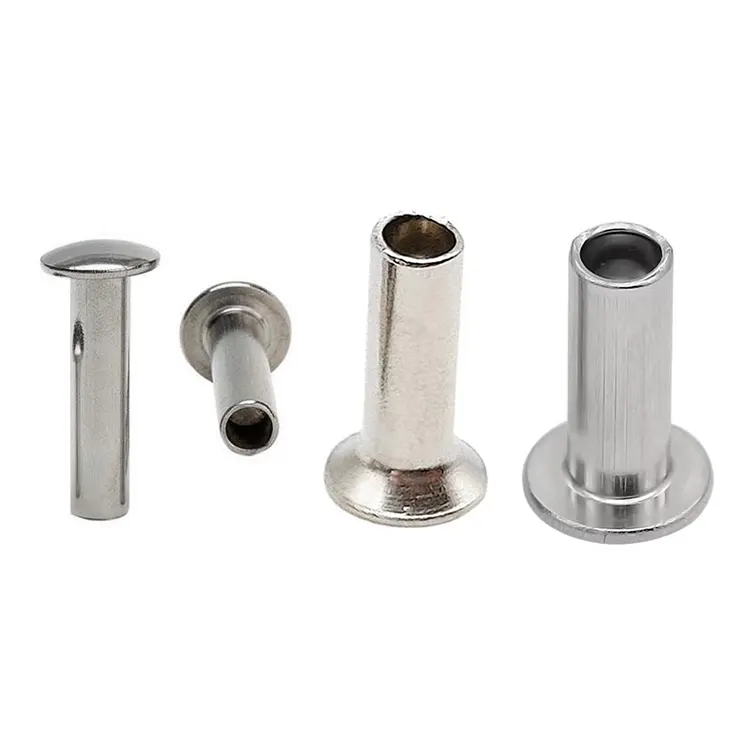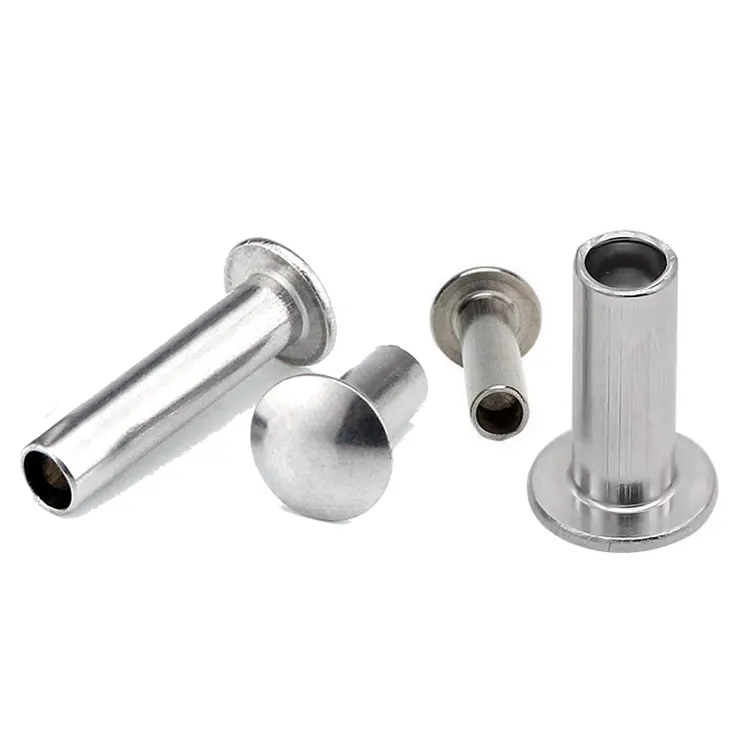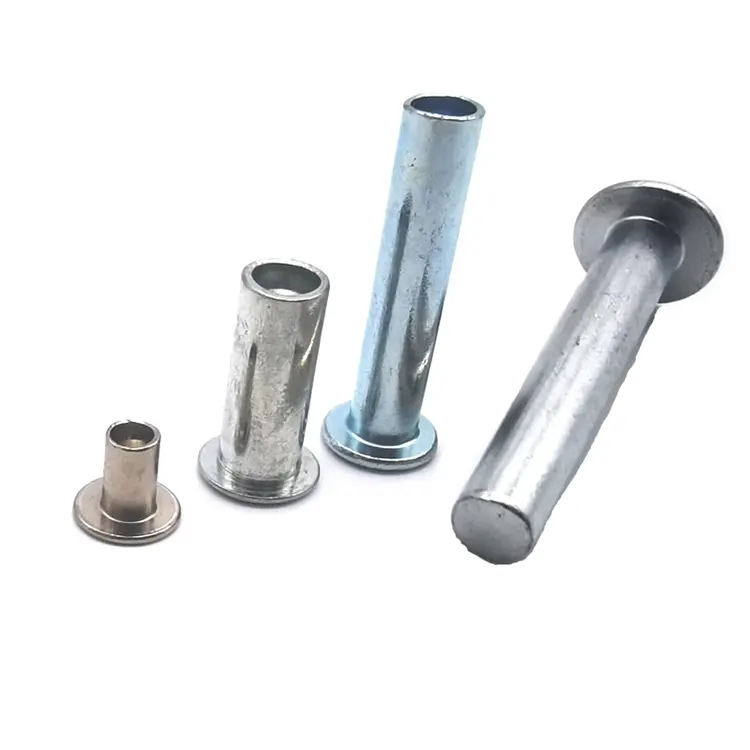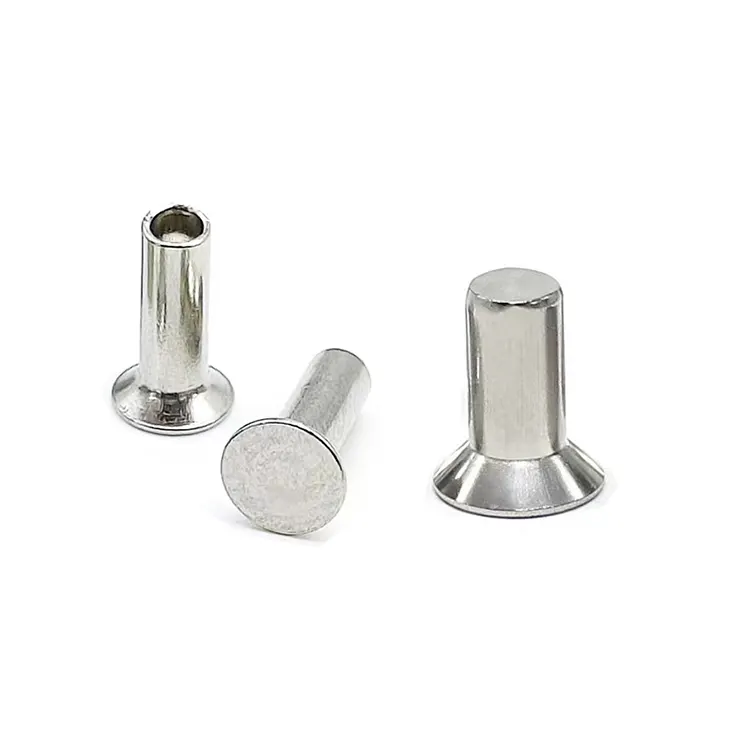Klinknagels
As one of professional manufacturer in China, Notin would like to provide you Rivets. And we will offer you the best after-sale service and timely delivery.
What is a rivet?
A rivet is a permanent mechanical fastener used to join two or more materials. Rivets work by inserting a metal pin into an aligned hole and deforming the end, creating a strong, secure, and durable connection. Unlike temporary fasteners like screws, rivets do not rely on threads, but instead form a permanent connection, making them ideal for applications requiring high strength, durability, and vibration resistance.
Classification of Rivets
Rivets are typically categorized by head shape, degree of hollowness, or material.
Based on head shape, rivets can be classified as flat head rivets, round head rivets, countersunk head rivets, mushroom head rivets, universal head rivets, truss head rivets, etc.

Based on degree of hollowness, rivets can be classified as solid rivets, semi-tubular rivets, or full tubular rivets.
Based on material, rivets can be classified as brass rivets, stainless steel rivets, steel rivets, aluminum rivets, copper rivets, etc.

What surface finishes are available for rivets?
Rivet surfaces are typically treated with rust-proofing treatments, primarily electroplating, including zinc plating, nickel plating, chrome plating, tin plating, gold plating, and silver plating. Electroplating is a common rust-proofing method for rivets. It applies a layer of plating to the rivet surface through physical or chemical methods. The plating effectively prevents corrosion and rust, while also providing a certain aesthetic effect.
Another special surface treatment method is head coating. Head coating is performed after the rivet is electroplated. This allows for a variety of colors on the rivet head, achieving an aesthetically pleasing finish.
Aluminum rivets cannot be electroplated, but they can be anodized. Anodizing also allows for a variety of color options, but the unit price is higher than electroplating.
Rust-proofing the rivet surface is crucial, effectively extending the rivet's service life and ensuring a secure connection. Different rust-proofing methods are suitable for different environments and applications, so the choice should be tailored to the specific situation.
- View as
IJzeren klinknagels met platte kop
Als gewone mechanische connector nemen ijzeren klinknagels met platte kop een belangrijke positie in op meerdere industriële gebieden vanwege hun ontwerpkenmerken en een breed scala aan toepassingen. Structureel is de klinknagelkop plat, schijfvormig en het lichaam cilindrisch. Het uiteinde is speciaal bewerkt om een verstoorde structuur te vormen. Na installatie zorgt druk of impact ervoor dat het lichaam uitzet, waardoor een mechanische verbinding met de gatwand ontstaat om een strak effect te bereiken. Vergeleken met klinknagels met ronde kop of klinknagels met verzonken kop heeft het ontwerp met platte kop aanzienlijke voordelen wat betreft krachtverdeling en contactoppervlak. Wanneer het bijvoorbeeld wordt blootgesteld aan afschuifkracht, kan de schijfvormige kop de belasting over een groter gebied verspreiden, waardoor de druk per oppervlakte-eenheid effectief wordt verminderd.
Lees verderStuur onderzoekIJzeren klinknagels met verzonken kop
De kop van een ijzeren klinknagel met verzonken kop heeft de vorm van een afgeknotte kegel, waarbij de kegel doorgaans een hoek van 90 ° of 120 ° maakt ten opzichte van de as van de klinknagel. Door deze vorm kan de kop van de klinknagel na installatie gelijk liggen met het oppervlak van het verbonden onderdeel, wat resulteert in een glad uiterlijk. Dit is met name geschikt voor toepassingen waarbij de vlakheid van het oppervlak van cruciaal belang is. Kom naar Nuote Metals om uw gewenste ijzeren klinknagel met verzonken kop op maat te maken. Onze ingenieurs, met meer dan 10 jaar ervaring, zijn zeer vertrouwd met de productie van diverse klinknageltypes.
Lees verderStuur onderzoekHalve buisvormige klinknagels
Een halve buisvormige klinknagel is een metalen sluiting die aan het ene uiteinde massief en aan het andere uiteinde gedeeltelijk hol is, meestal gemaakt van materialen zoals een aluminiumlegering, koper of staal. Het holle gedeelte beslaat ongeveer een derde tot de helft van de lengte van het klinknagellichaam. Door dit ontwerp kan de klinknagel een bevestigingseffect bereiken door extrusievervorming tijdens installatie. Vergeleken metstevige klinknagelsHalve buisvormige klinknagels worden gekenmerkt door een laag gewicht, eenvoudige installatie en brede toepasbaarheid; vergeleken met volledig holle klinknagels bieden ze een hogere sterkte en stabiliteit. Halve buisvormige klinknagels vereisen geen complexe apparatuur tijdens de installatie en kunnen meestal worden voltooid met handmatig of pneumatisch gereedschap. Daarom zijn ze op veel gebieden favoriet. Nuote Metals is gespecialiseerd in de productie van halfbuisvormige klinknagels, met een compleet assortiment mallen en staat open voor maatwerk.
Lees verderStuur onderzoekHalf holle klinknagels
Nuote Metals is gevestigd in Dongguan, China, wij zijn gespecialiseerd in de productie van een verscheidenheid aan klinknagels, waaronderstevige klinknagels, semi-buisvormige klinknagels, Envolledige buisvormige klinknagels. Halfholle klinknagels zijn een gebruikelijk industrieel bevestigingsmiddel, met een holle kernstructuur met een halfgesloten kop en schacht. Dankzij dit ontwerp kunnen ze lichtgewicht en hoge sterkte combineren, waardoor ze op grote schaal worden gebruikt in toepassingen die efficiënt klinken vereisen. Vergeleken met massieve klinknagels verminderen halfholle klinknagels het gewicht door minder materiaal te gebruiken, terwijl ze gebruik maken van plastische vervorming tijdens het klinken om een veilige verbinding te bereiken, waardoor ze bijzonder geschikt zijn voor gewichtsgevoelige toepassingen.
Lees verderStuur onderzoekKlinknagels met platte kop
Nuote Metals is gespecialiseerd in de vervaardiging van klinknagels en produceert een verscheidenheid aan materialen zoals roestvrij staal, messing, aluminium, koolstofstaal en koper. Klinknagels zijn een veelgebruikt bevestigingsmiddel dat wordt gebruikt in verschillende constructies en samenstellingen, zowel in de industriële productie als in het dagelijks leven. Klinknagels met platte kop zijn voor veel industrieën het product bij uitstek vanwege hun unieke prestaties en aanpassingsvermogen.
Lees verderStuur onderzoekVerzonken kop klinknagels
Verzonken klinknagels zijn een veelgebruikt mechanisch bevestigingsmiddel, voornamelijk gebruikt voor bevestigingstoepassingen die een hoge sterkte en een glad oppervlak vereisen. Dankzij het ontwerp met verzonken kop kunnen ze na installatie gelijk liggen met het werkstukoppervlak, waardoor eventuele uitsteeksels worden geëlimineerd die het uiterlijk of de functie kunnen beïnvloeden. Verzonken massieve klinknagels zijn daarentegen gemaakt uit één massief stuk materiaal, zonder holle delen. Ze worden doorgaans gebruikt om werkstukken professioneel te verbinden door middel van hameren of klinken. Er is ook een semi-buisvormige klinknagel met verzonken kop, met een hol gedeelte aan het uiteinde voor gemakkelijker klinken en minder arbeidsintensief dan massieve klinknagels.
Lees verderStuur onderzoekWhat are the advantages of rivets over other fasteners?
1. Ease of Installation
Rivets are fast to install, and even fully automated for high-volume applications, resulting in a simple and efficient operation process.
2. Connection Reliability
The riveting process is standardized, with strict quality control, resulting in highly stable connections. Visual inspection allows for quick verification of connection quality.
3. Vibration and Impact Resistance
Rivets connect through deformation or interference fit, providing strong clamping force and excellent vibration resistance, capable of withstanding vibration and shock.
4. Low Cost
Rivets are easy to install and can be fully automated, saving significant labor costs.
What are the advantages and disadvantages of rivets made of different materials?
Aluminum Rivets
Advantages: Lightweight, reduces overall product weight, low cost, suitable for general civilian applications.
Disadvantages: Low tensile and shear strength, unsuitable for high-strength workpieces, prone to electrochemical corrosion when in contact with metals such as stainless steel.
Stainless Steel Rivets
Advantages: Strong corrosion resistance, high hardness, suitable for high-strength workpieces (such as marine equipment)
Disadvantages: Higher cost, typically more expensive than aluminum rivets of the same specification.
Brass and Copper Rivets
Advantages: Excellent conductivity (such as connecting electronic components), good corrosion resistance.
Disadvantages: Higher cost, more difficult to process.
Steel Rivets
Advantages: High hardness, high connection reliability, and wide applicability.
Disadvantages: Compared to other materials, iron rivets are more prone to rusting.
What are the main applications of rivets?
Rivets have a wide range of uses, from small items like a pair of scissors to large items like airplanes and ships, as well as in high-precision medical applications.
Industrial Manufacturing
Rivets are used in a wide variety of industrial fields, wherever there is a need to connect two or more materials.
Electronics
Rivets secure heat sinks and chips, providing both vibration damping and noise reduction, and are widely used in the cooling systems of electronic products such as computers and mobile phones.
Automotive
Rivets are widely used to connect components of automobile bodies and chassis, such as doors and hoods. Their lightweight and corrosion-resistant properties make them an indispensable joining method in automotive manufacturing.
Aerospace
In aircraft manufacturing, rivets are used to connect different fuselage components, such as wings and tailplanes. Millions of rivets create high-strength, corrosion-resistant joints. Aluminum and titanium alloy rivets are often used to connect components of corresponding materials, ensuring stability in extreme environments.
Rivets are used everywhere. The above examples only represent a small number of their applications. We see rivets everywhere in our daily lives, such as on scissors, folding beds, and strollers etc. Rivets can be customized to different sizes and materials depending on the application.
Nuote Metals has specialized in the rivet industry for over a decade. Our factory is located in Dongguan, a city known as the "World Factory," a city with a developed industry and convenient transportation. This allows us to respond quickly when acquiring raw materials and supporting surface treatments, meeting our customers' needs for quick access to samples and bulk orders. We produce 10 million rivets daily and have molds of various specifications, allowing us to produce rivets as small as 0.8mm and as large as 10mm. We welcome your inquiries and visits.







